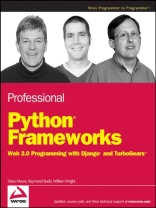As two of the leading MVC web frameworks for Python, Django and Turbo Gears allow you to develop and launch sites in a fraction ofthe time compared to traditional techniques and they providegreater stability, scalability, and management than alternatives.Packed with examples, this book will help you discover a newmethodology for designing, coding, testing, and deploying rich webapplications.A team of expert authors shows you the power of MVC frameworks andthe capabilities of the Turbo Gears and Django packages. The Djangochapters show you how to automate production of common webdevelopment tasks, portal creation, and content management, so youcan focus on higher-level application issues and design. The Turbo Gears chapters illustrate how to rapidly create modern, highlyinteractive Web 2.0 applications. For both frameworks, you’llcreate useful applications that exemplify common Web 2.0 designparadigms and their solutions. Ultimately, you’ll leverage your Python skills using Django and Turbo Gears and go from novice to RIAexpert.What you will learn from this book* How you can use frameworks to save you time and frustration inthe development cycle* The elements, differences, and similarities of the Turbo Gears and Django frameworks* Advanced capabilities of both frameworks and how they easily solveissues common to web applications* Approaches to simplifying your client side Java Script(r) with Mochi Kit, a Pythonic Java Script library* How to pair Turbo Gears with Flash for even more possibilities Who this book is for This book is for Python developers who want to learn rapid Web 2.0development techniques using frameworks and incorporating amodel-view-controller architecture.Wrox Professional guides are planned and written by workingprogrammers to meet the real-world needs of programmers, developers, and IT professionals. Focused and relevant, theyaddress the issues technology professionals face every day. Theyprovide examples, practical solutions, and expert education in newtechnologies, all designed to help programmers do a better job.
表中的内容
Acknowledgments.Introduction.Part I: Introduction to Python Frameworks.Chapter 1: Web 2.0, Python, and Frameworks.Chapter 2: Web 2.0 with Traditional Python.Chapter 3: Introducing the Frameworks.Part II: Turbo Gears.Chapter 4: Introduction to Turbo Gears.Chapter 5: User Identity and Visitor Tracking.Chapter 6: Widgets.Chapter 7: Advanced Turbo Gears Topics.Part III: Django.Chapter 8: Dblog: A Blog Implemented in Django.Chapter 9: Django Views and Users.Chapter 10: Advanced Django Topics: AJAX, RSS, and More.Part IV: Advanced Client-Side Topics.Chapter 11: Mochi Kit — Pythonic Java Scripting.Chapter 12: Flash-Based Interfaces and Turbo Gears.Appendix A: Tools Used.Index.
关于作者
Dana Moore is a division scientist with BBN Technologies andis an acknowledged expert in the fields of peer-to-peer andcollaborative computing, software agent frameworks, and assistiveenvironments. Prior to joining BBN, Dana was chief scientist for Roku Technologies and a distinguished member of technical staff at Bell Laboratories. Dana is a popular conference speaker and auniversity lecturer. He has written articles for numerous computingpublications and coauthored the books Peer-to-Peer: Building Secure, Scalable, and Manageable Networks; Jabber Developer’s Handbook; and Rich Internet Applications. Dana holds a Master of Science degree from the University of Maryland and a Bachelor of Science degree in industrial design, also from the University of Maryland.Raymond Budd is a software engineer with BBNTechnologies. He has designed, developed, and supported a varietyof web applications and other distributed systems in Java, Ruby, and Python. He has been published in several conference proceedingssuch as the Eighteenth National Conference on Artificial Intelligence and journals including Applied Intelligence. Additional areas of interest include knowledgerepresentations, knowledge engineering, and distributed planningand scheduling. He received a Bachelor of Science degree incomputer science from the University of Pittsburgh.William Wright is a senior principal investigator with SPARTA, where he develops networking software for systemsdistributed across the globe. His interests include real-timeembedded systems, software architecture for reuse, and softwareagent frameworks. A frequent conference speaker, William has alsowritten for Dr. Dobb’s Journal, Java Developer’s Journal, and Embedded Systems Programming, among others. He coauthored the books Jabber Developer’s Handbook and Beginning Java Networking. William holds a Master of Science degree incomputer science from George Mason University and a Bachelor of Music degree in education from Indiana University.












